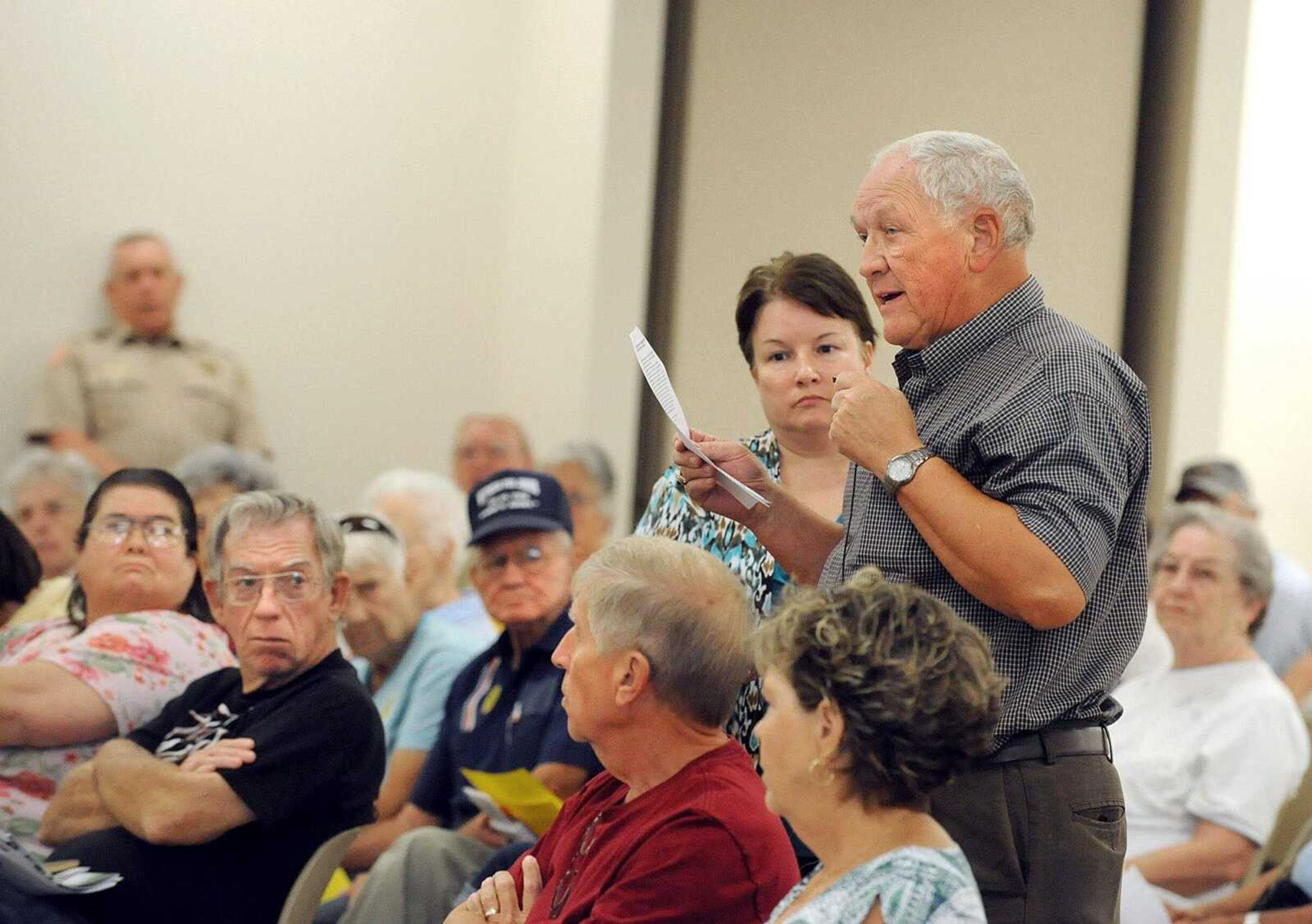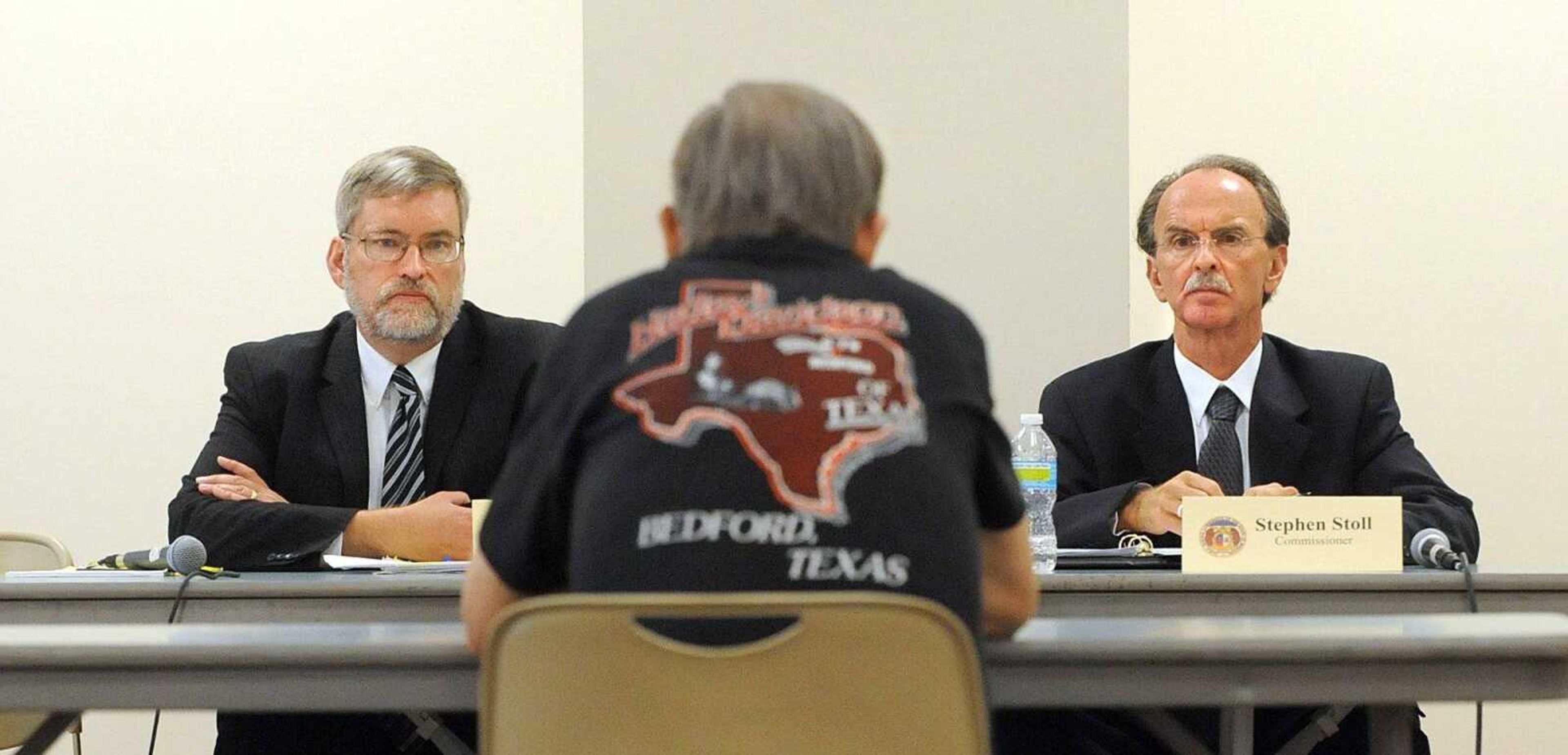Regulators hear impassioned pleas to keep Ameren rates same at Cape Girardeau hearing
Locals pleaded with the Missouri Public Service Commission not to approve a 14 percent rate increase proposed by Ameren Missouri during a two-and-a-half hour hearing Tuesday at the Osage Centre. Fifteen people gave sworn testimony telling the commission Ameren needs to cut its own expenses, rather than raise rates on seniors
Locals pleaded with the Missouri Public Service Commission not to approve a 14 percent rate increase proposed by Ameren Missouri during a two-and-a-half-hour hearing Tuesday at the Osage Centre.
Fifteen people gave sworn testimony telling the commission Ameren needs to cut its expenses rather than raise rates on seniors, the disabled, the elderly and the unemployed, who are already struggling to pay bills.
"I have literally seen utility bills suck the life out of entire families," said Pastor Scott Johnson of Soulful Harvest Ministries, who works with families in need on Cape Girardeau's south side. He said 95 percent of the 40 people his ministry serves are employed, but they just can't earn enough to keep up with their Ameren bill.

"I deal with people every day who come to me contemplating suicide over a utility bill. I know people who are losing their children because they can't keep their utilities on. I had a little boy tell me, 'I don't want to sell dope, but my mom needs to keep her lights on and I can't find a job,'" Johnson said.
Tuesday's hearing hosted by the Missouri Public Service Commission, which regulates the state's investor-owned utilities, was one of a dozen being held across the state to receive input from utility customers on Ameren's fifth rate increase request in six years.
In February, Ameren asked to increase its revenue by $375.6 million, or $14 a month based on 1,100 kilowatt-hours of usage, to cover higher costs and make needed upgrades.
Ameren is also asking the Public Service Commission to allow it a rate of return on equity -- the profit on shareholders' investments in the company -- of 10.75 percent. This rate is currently set at 10.2 percent, but Ameren's vice president of legislative affairs, Warren Wood, said the company rarely earns this rate and most of what it does earn from its rate of return on equity is reinvested into upgrading the company's power transmission and generation systems.
Lewis Mills of the Office of the Public Counsel, which represents Missouri's residential utility customers, said his office is recommending to the PSC that Ameren be allowed a profit margin of around 8 percent.
The Missouri Public Service Commission's staff is recommending an increase that is $165.3 million less than Ameren's request. That would equate to a 9.2 percent increase, or $8.69 more per month on the average Ameren Missouri bill. It's also recommending a rate of return on equity between 8 and 9 percent.
Ameren claims 27 percent of its rate increase request is to cover higher net fuel costs; 23 percent is to cover improvements to make its aging power infrastructure more reliable; 22 percent is to cover higher costs for energy efficiency programs required under the Missouri Energy Efficiency Investment Act; and 28 percent is to cover the increasing cost of meeting renewable energy requirements.
Several people who spoke at the hearing criticized Ameren for not using more renewable energy. Currently about 4 percent of its power is from renewable sources. Under Proposition C, approved by voters in 2008, all of Missouri's investor-owned utilities must generate 15 percent of their power from renewable sources by 2021, which Wood said Ameren is working toward.
Ameren's rates are currently 25 percent below the national average and 16 percent below the Midwest average, Wood said. They're also the lowest of any of Missouri's investor-owned utilities.
Still, residents told the commission too many people are already struggling to pay their electric bills at current rates.
Carl Patterson, who has been a volunteer tax preparer for 20 years helping low-income and disabled people, said that while no one likes higher rates, for some this increase will be a real challenge.
Wayne Godwin said Ameren has raised its rates 36 percent in the past four years, but those on fixed incomes like him are seeing only small if any increases in their Social Security payments.
"We've got to stand up and say 'Whoa, this is enough.' It's not only me, I'm talking about a bunch of people who couldn't make it here today because they didn't have gas money to get here," Godwin said.
Godwin said increasing prices of gas, food and medicine are making it tough to stay ahead.
"I think it's time they kind of suck it up. We know good and well the top dogs at AmerenUE are making some big bucks. They've got plenty of money to operate on as it is," Godwin said.
Ameren CEO Tom Voss got a 20 percent raise in 2011, bringing his salary and benefits package to $5.7 million, according to a St. Louis Post-Dispatch editorial in April.
Bill Hinckley, who volunteers at the Salvation Army regularly, said Ameren will be the only one who benefits from the proposed rate increase.
"Everyone else will be hurt by such an action. They're interested in getting more than their fair share while the rest of Missouri suffers," he said.
Hinckley told the commission about those who wait in line for food at the Salvation Army and asked that the commission not allow Ameren to add to their burden.
Stephen Brewen of the East Missouri Action Agency, which administers utility assistance programs for low-income families, told the commission a 14 percent increase was unsustainable and opposed by his agency.
"Entities that provide essential services should not continue to increase their profit margins on the backs of low-income customers," he said. Missouri's current poverty rate is 14 percent, with one in five children living in poverty, and this rate increase is likely to push that number even higher, he said.
Ameren maintains that the company's electric rates over the past 20 years have risen just 12 percent, while the cost of eggs has increased more than 20 percent and the cost of gasoline 200 percent, Wood said.
The Missouri Public Service Commission also held a hearing Tuesday in Dexter, Mo., and will continue with others around the state this week. The commission will also conduct an evidentiary hearing at its offices in Jefferson City, Mo., from Sept. 24 through Oct. 12. Those unable to attend a public hearing who wish to submit comments may call 800-392-4211 or visit psc.mo.gov.
mmiller@semissourian.com
388-3646
Pertinent address:
1625 N. Kingshighway, Cape Girardeau, MO
Connect with the Southeast Missourian Newsroom:
For corrections to this story or other insights for the editor, click here. To submit a letter to the editor, click here. To learn about the Southeast Missourian’s AI Policy, click here.











